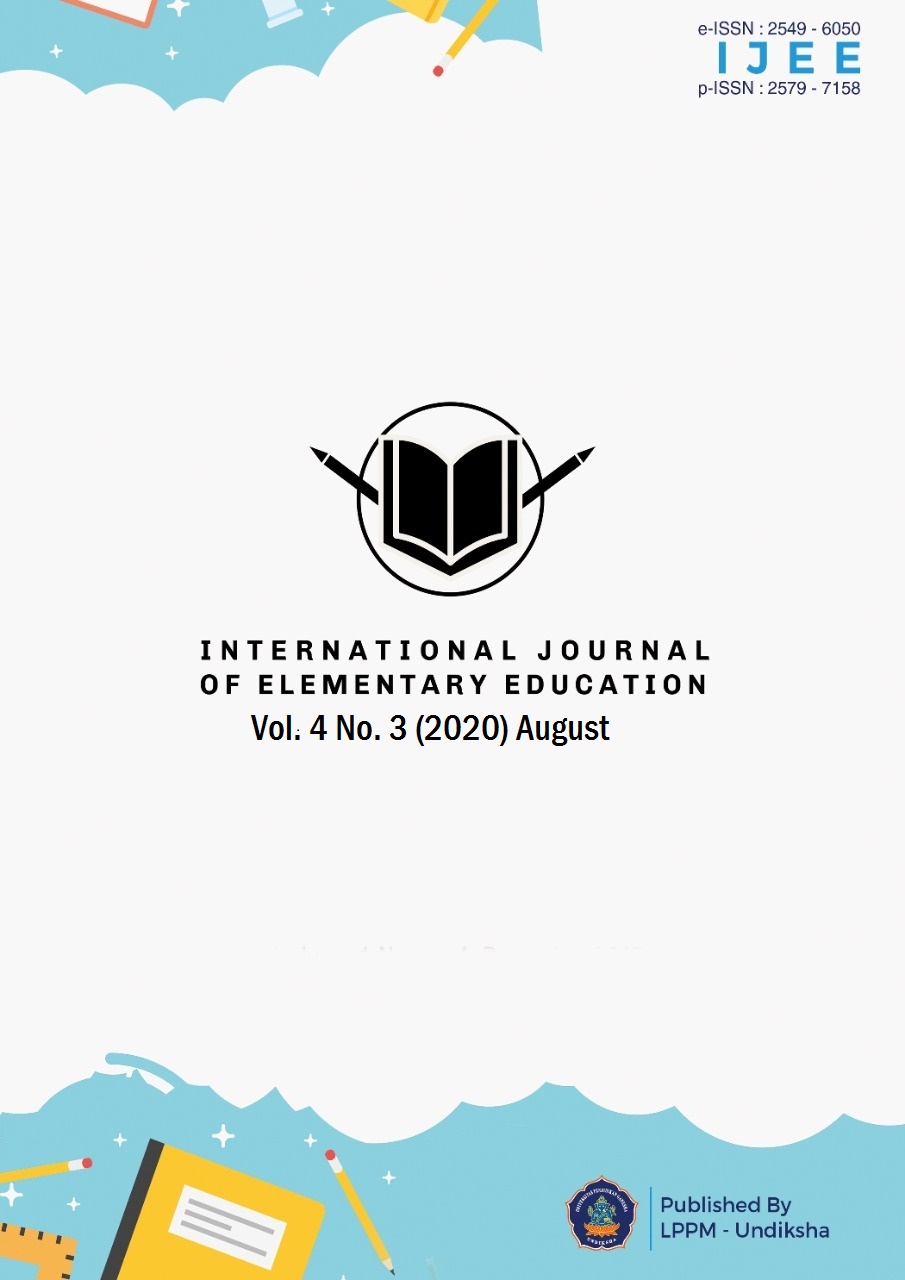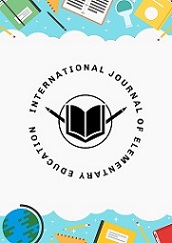Implementation of the 2013 Curriculum Based on a Scientific Approach (Case Study at SD Cluster II Kintamani)
DOI:
https://doi.org/10.23887/ijee.v4i3.28172Kata Kunci:
2013 curriculum, scientific approach, elementary schoolAbstrak
Curriculum changes often occur in the world of education, as we know that the current curriculum used in education units is the 2013 curriculum. With the change in the curriculum, teachers should know the important points in the 2013 curriculum, namely: (1) knowledge of the 2013 curriculum; (2) skills in designing the 2013 curriculum learning tools; (3) the skills to implement the 2013 curriculum. Therefore, this study aims to analyze: the understanding of elementary school homeroom teachers in Cluster II Kintamani regarding the implementation of the 2013 curriculum based on a scientific approach, the skills of homeroom teachers in preparing the 2013 curriculum lesson-based approach scientific, and the skills of homeroom teachers in applying the 2013 curriculum lesson plan based on the scientific approach. This research uses a descriptive qualitative approach. This research was conducted by involving 9 homeroom teachers in Gugus II Kintamani. The data in this study were collected using the interview method, documentation study, and observation. Data were analyzed using data reduction techniques and data verification was carried out on respondents and documentary evidence. The results of this study indicate that the homeroom teachers of Kintamani cluster II understand and are able to design the 2013 curriculum lesson plan based on a scientific approach, but not all teachers are able to implement it properly. According to the results of this study, continuous assistance is needed so that the implementation of the 2013 curriculum based on a scientific approach can be carried out properly by teachers.
Referensi
Abhyasari, N. P., Kusmariyatni, N. N., & Agustiana, I. G. A. T. (2020). Pengaruh Pembelajaran Berpendekatan Saintifik Berbasis Masalah Terhadap Disiplin dan Hasil Belajar IPA. Mimbar PGSD Undiksha, 8(1), 111–122.
Agung, A. A. G. (2014). Metodelogi Penelitian Pendidikan. Aditya Media Publishing.
Ashri, A. N. (2017). Analisis Kesiapan Guru Dalam Implementasi Kurikulum 2013 Berdasarkan RPP Tahun 2014 SD Muhammadiyah 21 Baluwarti DI. Ekp, 13(3), 1576–1580.
Azizah, R. (2019). Implementasi kurikulum 2013 pada mata pelajaran tematik (studi kasus di mi ma’arif patihan wetan ponorogo). Institut Agama Islam Negeri Ponorogo.
Budiyanto, K., Waluyo, L., & Mokhtar, A. (2016). Implementasi Pendekatan Saintifik dalam Pembelajaran di Pendidikan Dasar di Malang. Proceeding Biology Education Conference, 13(1), 46–51.
Candra, A. A., & Masruri, M. S. (2015). Pengembangan Multimedia Interaktif Dengan Pendekatan Saintifik Untuk Pembelajaran PKn SMP. Harmoni Sosial: Jurnal Pendidikan IPS, 2(2), 109–144. https://doi.org/https://doi.org/10.21831/hsjpi.v2i2.7662
Fadliyatis, K. S., Harsiati, T., & Hasanah, M. (2016). Pengembangan Instrumen Asesmen Autentik Keterampilan Menulis Teks Cerpen Dan Teks Fabel Untuk Siswa Smp / Mts. Jurnal Pendidikan, 1(3), 421–427. https://doi.org/http://dx.doi.org/10.17977/jp.v1i3.6168
Fahdarani, R. R. (2015). Implementasi pendekatan saintifik pada kurikulum 2013 di kelas 4 sdn cijantung 03 pagi. Universitas Islam Negeri Syarif Hidayatullah.
Fahreza, F. (2005). Analisis Penerapan Pendekatan Saintifik Di SD Se-Kecamatan Binjai Utara Kota Binjai. Naspa Journal, 42(4), 1. https://doi.org/10.1017/CBO9781107415324.004
Halimah, L. (2017). Keterampilan Mengajar. Refika Aditama.
Hapsari, E. E., Sumantri, M. S., & Astra, I. M. (2019). Strategi Guru Meningkatkan Hasil Belajar Menggunakan Pendekatan Saintifik Di Sekolah Dasar. Jurnal Basicedu, 3(2), 850–860. https://doi.org/10.31004/basicedu.v4i4.445
Hidayati, W. N. (2019). Penerapan Pendekatan Saintifik Pada Pembelajaran IPA Kelas V DI MI Islamiyah Kroya Tahun Pelajaran 2017/2018 Skripsi (Vol. 53, Issue 9) [Institut Agama Islam Negeri (IAIN) Purwokerto]. https://doi.org/10.1017/CBO9781107415324.004
Ibrahim, Ridwan, & Arifin. (2019). Implementasi Kurikulum 2013 Untuk Meningkatkan Kualitas Pendidikan di Indonesia ( Kajian Proses Pembelajaran K-13 di Kota Tarakan dan Kabupaten Bulungan Kalimantan Utara ). Borneo Journal Of Biology Education, 1(1), 74–81.
Kurniasari, F. (2017). Implementasi Pendekatan Saintifik Pada Penugasan Aktivitas Di Buku Teks Bahasa Indonesia Kelas VII SMP Berdasarkan Kurikulum 2013. Jurnal Pendidikan Edutama, 4(1), 9–26. https://doi.org/http://dx.doi.org/10.30734/jpe.v4i1.44
Kurniawan, & Fatonny, M. (2016). Perangkat Lunak Ajar Dengan Pendekatan Saintifik Kurikulum 2013 Berbasis Android (Studi Kasus Tematik 4 Tema 5). Jurnal Informatika, 5(1), 64–71.
Makaborang, Y. (2019). Evaluasi Implementasi Kurikulum 2013 Mata Pelajaran Biologi Di SMA Negeri. Kelola: Jurnal Manajemen Pendidikan, 6(2), 130–145. https://doi.org/10.24246/j.jk.2019.v6.i2.p130-145
Masita, D. (2015). Pembelajaran Tematik Dengan Pendekatan Saintifik Dalam Implementasi Kurikulum 2013 (Studi Multi Kasus di SDN Turen 03 Kecamatan Turen dan MIT Ar-Roihan Kecamatan Lawang Kabupaten Malang) (Vol. 2013).
Meliawati, N. W., Suarjana, I. M., & Mahadewi, L. P. P. (2015). Analisis Penerapan Pendekatan Saintifik Terhadap Dalam Pembelajaran Berdasarkan Kurikulum 2013. MIMBAR PGSD Undiksha, 3(1).
Moleong. (2006). Metodelogi Penelitian Kualitatif. PT REMAJA ROSDAKARYA.
Muharmiati, M., Hermita, N., & Guslinda. (2020). Analisis Penerapan Pendekatan Saintifik Dalam Kurikulum 2013 Di Kelas V SD Negeri 13 Pekanbaru Meri Muharmiati*, Neni Hermita, Guslinda Pendidikan Guru Sekolah Dasar FKIP Universitas Riau. Jurnal Penelitian Ilmu Pendidikan, 3, 104–113.
Nugraheni, E. P. (2019). Implementasi Kurikulum 2013 Pada Pembelajaran PAI Siswa Tunagrahita ( Studi Kasus Siswa Tunagrahita Sedang Kelas VII di SLB N 2 Yogyakarta ) 1. X(2), 140–150.
Nurbaya, Hala, Y., Hartati, Wiharto, M., & Daud, F. (2018). Hubungan Pendekatan Saintifik dan Motivasi Belajar dengan Hasil Belajar. UNM Journal of Biological Education, 1(i).
Nurdyansyah, & Fahyuni, E. F. (2016). Inovasi Model. In Nizmania Learning Center.
Pangandosan, A. (2018). Implementasi Pendekatan Saintifik Pada Kelas Rendah Di SD Negeri 1 Rawalaut Bandar Lampung. Society, 14–18.
Persada, Y. I., Djatmika, E. T., & Degeng, I. N. S. (2020). Pelaksanaan Pendekatan Scientific Dalam Pembelajaran Tematik. 114–120.
Pujiyanto, P. (2013). Naskah Publikasi Pengelolaan Kurikulum dan Pembelajaran 2013 Sekolah Dasar (Studi Situs Di SD Hj. Isriati Baiturrahman 1 Semarang). Universitas Muhammadiyah Surakarta.
Rini Kristiantari, M. (2015). Analisis Kesiapan Guru Sekolah Dasar dalam Mengimplementasikan Pembelajaran Tematik Integratif Menyongsong Kurikulum 2013. JPI (Jurnal Pendidikan Indonesia), 3(2), 460–470. https://doi.org/10.23887/jpi-undiksha.v3i2.4462
Rostika, D & Zulkarnain, W. (2016). Analisis Implementasi Kurikulum 2013 dengan Sistem Kredit Semester. Manajemen Pendidikan, 25(2), 191–199.
Rudyanto, H. E. (2016). Model Discovery Learning Dengan Pendekatan Saintifik Bermuatan Karakter Untuk Meningkatkan Kemampuan Berpikir Kreatif. Premiere Educandum : Jurnal Pendidikan Dasar Dan Pembelajaran, 4(01), 41–48. https://doi.org/10.25273/pe.v4i01.305
Said, I. M., Sutadji, E., & Sugandi, M. (2019). Pengembangan Bahan Ajar Berbasis Cooperative Learning Dengan Pendekatan Saintifik Untuk Siswa Smk Se-Kota Malang Program Keahlian Teknik Ototronik. Jurnal Pendidikan: Teori, Penelitian Dan Pengembangan, 1(2), 265–270. https://doi.org/http://dx.doi.org/10.17977/jp.v1i2.6131
Subadi, T., Priyono, K. D., Dahroni, & Musyiyam, M. (2013). Implementasi Pembelajaran IPS Berbasis Kurikulum 2013 Melalui Lesson Study Di Sekolah Muhammadiyah Kartasura. WARTA, 18(1), 62–76. https://doi.org/https://doi.org/10.23917/warta.v18i1.1168
Sugiyanto, S., Kartowagiran, B., & Jailani, J. (2015). Pengembangan Model Evaluasi Proses Pembelajaran Matematika Di SMP Berdasarkan Kurikulum 2013. Jurnal Penelitian Dan Evaluasi Pendidikan, 19(1), 82–95. https://doi.org/10.21831/pep.v19i1.4558
Ula, F. (2015). Implementasi Pendekatan Saintifik Pada Kelas 1 Di SDN Mergosono 3 Kecamatan Implementasi Pendektan Saintifik Pada Pembelajaran Kurikulum 2013 Tema 7 Subtema 5.
Wahyuni, S., & Kurniawan, T. (2019). Analisis Pelaksanaan Kurikulum 2013 Pada Mata Pelajaran Ekonomi SMA Berakreditasi A Di Kota Solok (Studi Kasus Pada SMA N 4 Solok). Jurnal EcoGen, 2(22), 706–714.
Wakhidah, F. N. H. (2019). Implementasi pembelajaran matematika dengan pendekatan saintifik di mi murni sunan drajat lamongan. Universitas Islam Negeri Maulan Malik Ibrahim.
Yanwar, A., & Fadila, A. (2019). Analisis Kemampuan Berpikir Kritis Matematis : Dampak Pendekatan Saintifik ditinjau dari Kemandirian Belajar. Desimal: Jurnal Matematika, 2(1), 9–22. https://doi.org/10.24042/djm.v2i1.3204
Yeti. (2017). Dalam Pembelajaran Bahasa Arab Di Kelas X Man Purwokerto 2. Journal IAN.
Yustitia, V., Rusminati, S. H., & Sulistyawati, I. (2018). Penerapan model think pair share dengan pendekatan saintifik melalui lesson study pada mata kuliah evaluasi pembelajaran SD. Premiere Educandum : Jurnal Pendidikan Dasar Dan Pembelajaran, 8(1), 88. https://doi.org/10.25273/pe.v8i1.2621
Zaman, Q. (2017). Implementasi Pendekatan Saintifik Kurikulum. Universitas Islam Negeri Maulana Malik Ibrahim.
Unduhan
Diterbitkan
Cara Mengutip
Terbitan
Bagian
Lisensi
Authors who publish with the International Journal of Elementary Education agree to the following terms:
- Authors retain copyright and grant the journal the right of first publication with the work simultaneously licensed under a Creative Commons Attribution License (CC BY-SA 4.0) that allows others to share the work with an acknowledgment of the work's authorship and initial publication in this journal.
- Authors are able to enter into separate, additional contractual arrangements for the non-exclusive distribution of the journal's published version of the work (e.g., post it to an institutional repository or publish it in a book), with an acknowledgment of its initial publication in this journal.
- Authors are permitted and encouraged to post their work online (e.g., in institutional repositories or on their website) prior to and during the submission process, as it can lead to productive exchanges, as well as earlier and greater citation of published work. (See The Effect of Open Access)










